Exploring Advance Care Planning in Palliative Nursing Care
VerifiedAdded on 2022/09/22
|7
|1727
|19
Essay
AI Summary
This essay delves into the critical role of advance care planning (ACP) within the context of palliative nursing care. It emphasizes the patient-centered approach, highlighting the importance of communication, reflection, and the discussion of values and preferences for future care. The essay explores the perspectives on ACP, particularly for palliative care, which aims to reduce distressing symptoms and improve the quality of life for patients in their terminal phases. It underscores effective communication as the key to ethical palliative care, providing direction for the proper handling of patients and addressing ethical dilemmas. The essay examines the significance of ACP for older and chronically ill individuals, detailing how healthcare personnel can record patient wishes and preferences. It discusses the importance of respecting patient autonomy and providing accurate information about their disease, treatment options, and prognosis. Furthermore, the essay outlines best practices for ACP, including patient-centered approaches, respecting autonomy, and the role of decision-makers in advocating for the patient. The conclusion reinforces the necessity of ACP for providing proper care and treatment, emphasizing the need for nurses to prioritize patient autonomy and adopt a patient-centered approach. The essay also includes references to support its claims and arguments.
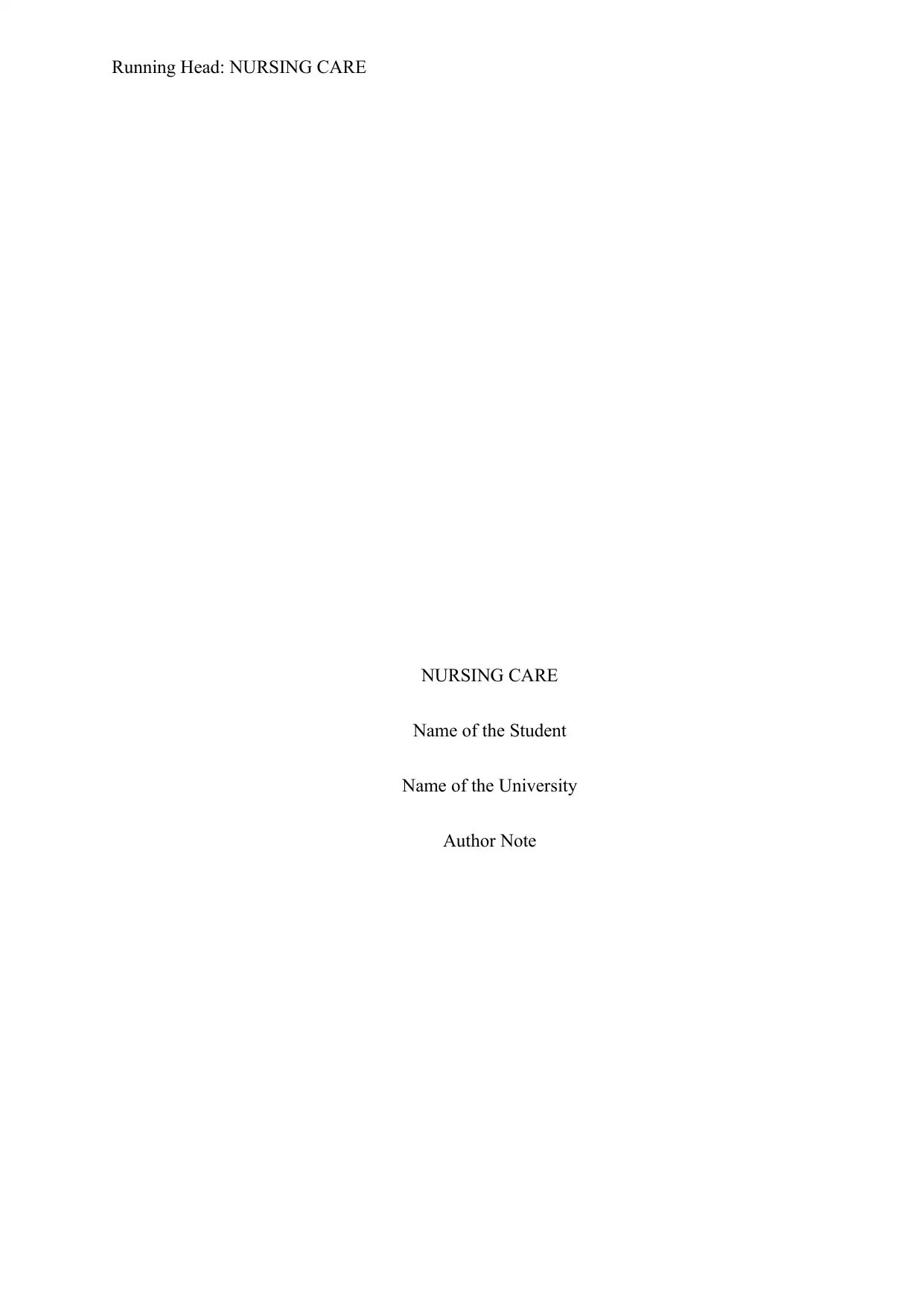
Running Head: NURSING CARE
NURSING CARE
Name of the Student
Name of the University
Author Note
NURSING CARE
Name of the Student
Name of the University
Author Note
Paraphrase This Document
Need a fresh take? Get an instant paraphrase of this document with our AI Paraphraser
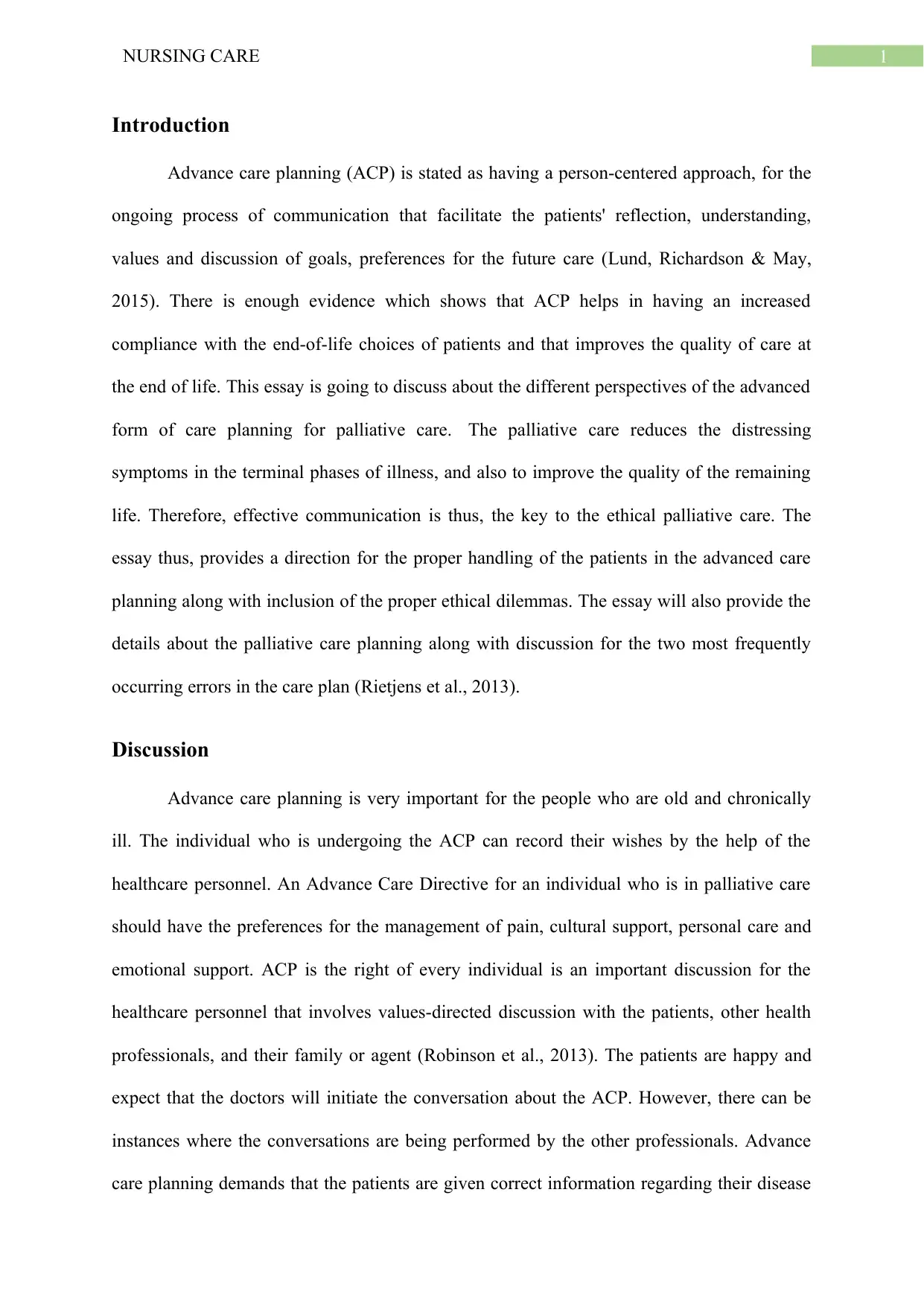
1NURSING CARE
Introduction
Advance care planning (ACP) is stated as having a person-centered approach, for the
ongoing process of communication that facilitate the patients' reflection, understanding,
values and discussion of goals, preferences for the future care (Lund, Richardson & May,
2015). There is enough evidence which shows that ACP helps in having an increased
compliance with the end-of-life choices of patients and that improves the quality of care at
the end of life. This essay is going to discuss about the different perspectives of the advanced
form of care planning for palliative care. The palliative care reduces the distressing
symptoms in the terminal phases of illness, and also to improve the quality of the remaining
life. Therefore, effective communication is thus, the key to the ethical palliative care. The
essay thus, provides a direction for the proper handling of the patients in the advanced care
planning along with inclusion of the proper ethical dilemmas. The essay will also provide the
details about the palliative care planning along with discussion for the two most frequently
occurring errors in the care plan (Rietjens et al., 2013).
Discussion
Advance care planning is very important for the people who are old and chronically
ill. The individual who is undergoing the ACP can record their wishes by the help of the
healthcare personnel. An Advance Care Directive for an individual who is in palliative care
should have the preferences for the management of pain, cultural support, personal care and
emotional support. ACP is the right of every individual is an important discussion for the
healthcare personnel that involves values-directed discussion with the patients, other health
professionals, and their family or agent (Robinson et al., 2013). The patients are happy and
expect that the doctors will initiate the conversation about the ACP. However, there can be
instances where the conversations are being performed by the other professionals. Advance
care planning demands that the patients are given correct information regarding their disease
Introduction
Advance care planning (ACP) is stated as having a person-centered approach, for the
ongoing process of communication that facilitate the patients' reflection, understanding,
values and discussion of goals, preferences for the future care (Lund, Richardson & May,
2015). There is enough evidence which shows that ACP helps in having an increased
compliance with the end-of-life choices of patients and that improves the quality of care at
the end of life. This essay is going to discuss about the different perspectives of the advanced
form of care planning for palliative care. The palliative care reduces the distressing
symptoms in the terminal phases of illness, and also to improve the quality of the remaining
life. Therefore, effective communication is thus, the key to the ethical palliative care. The
essay thus, provides a direction for the proper handling of the patients in the advanced care
planning along with inclusion of the proper ethical dilemmas. The essay will also provide the
details about the palliative care planning along with discussion for the two most frequently
occurring errors in the care plan (Rietjens et al., 2013).
Discussion
Advance care planning is very important for the people who are old and chronically
ill. The individual who is undergoing the ACP can record their wishes by the help of the
healthcare personnel. An Advance Care Directive for an individual who is in palliative care
should have the preferences for the management of pain, cultural support, personal care and
emotional support. ACP is the right of every individual is an important discussion for the
healthcare personnel that involves values-directed discussion with the patients, other health
professionals, and their family or agent (Robinson et al., 2013). The patients are happy and
expect that the doctors will initiate the conversation about the ACP. However, there can be
instances where the conversations are being performed by the other professionals. Advance
care planning demands that the patients are given correct information regarding their disease
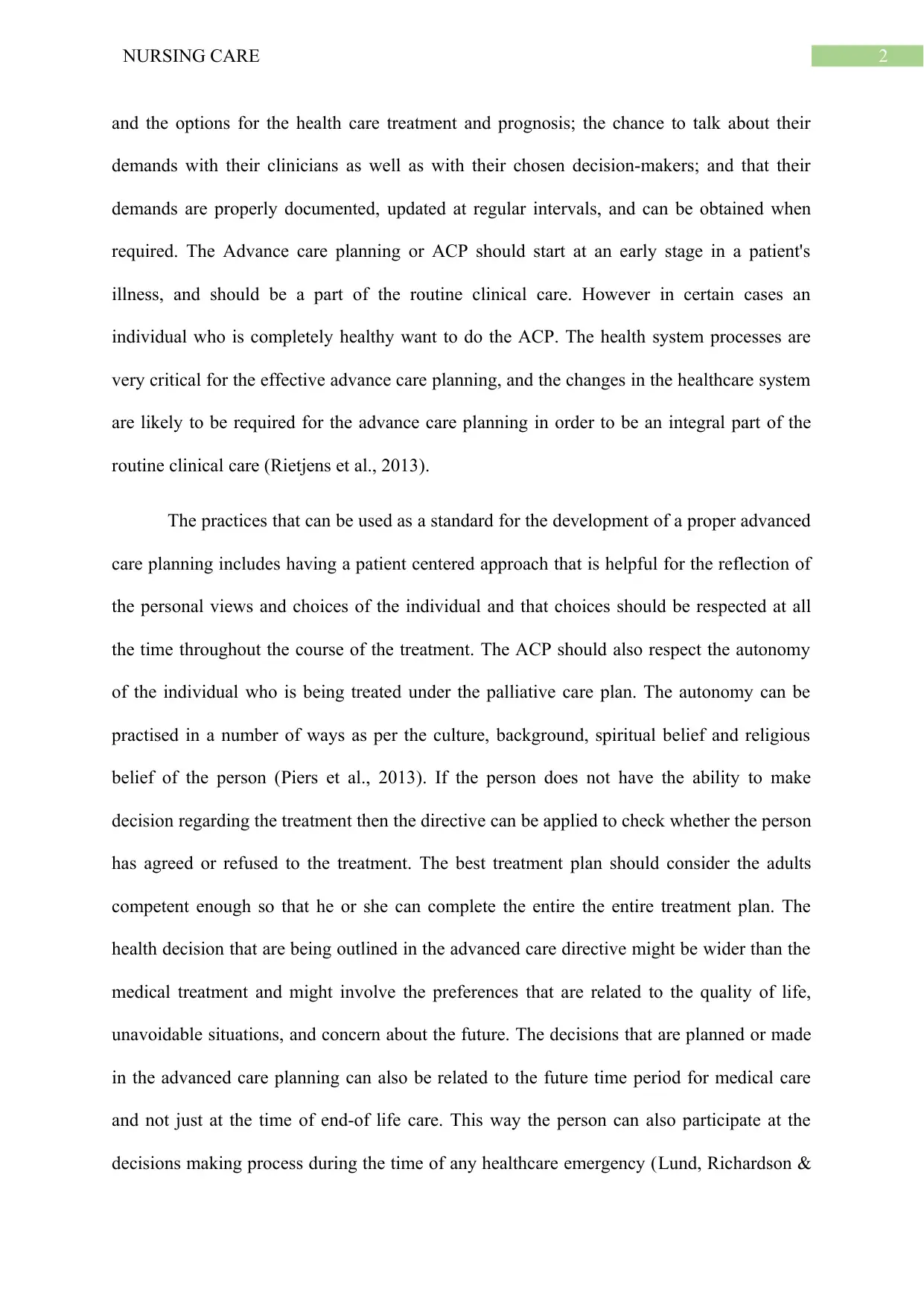
2NURSING CARE
and the options for the health care treatment and prognosis; the chance to talk about their
demands with their clinicians as well as with their chosen decision-makers; and that their
demands are properly documented, updated at regular intervals, and can be obtained when
required. The Advance care planning or ACP should start at an early stage in a patient's
illness, and should be a part of the routine clinical care. However in certain cases an
individual who is completely healthy want to do the ACP. The health system processes are
very critical for the effective advance care planning, and the changes in the healthcare system
are likely to be required for the advance care planning in order to be an integral part of the
routine clinical care (Rietjens et al., 2013).
The practices that can be used as a standard for the development of a proper advanced
care planning includes having a patient centered approach that is helpful for the reflection of
the personal views and choices of the individual and that choices should be respected at all
the time throughout the course of the treatment. The ACP should also respect the autonomy
of the individual who is being treated under the palliative care plan. The autonomy can be
practised in a number of ways as per the culture, background, spiritual belief and religious
belief of the person (Piers et al., 2013). If the person does not have the ability to make
decision regarding the treatment then the directive can be applied to check whether the person
has agreed or refused to the treatment. The best treatment plan should consider the adults
competent enough so that he or she can complete the entire the entire treatment plan. The
health decision that are being outlined in the advanced care directive might be wider than the
medical treatment and might involve the preferences that are related to the quality of life,
unavoidable situations, and concern about the future. The decisions that are planned or made
in the advanced care planning can also be related to the future time period for medical care
and not just at the time of end-of life care. This way the person can also participate at the
decisions making process during the time of any healthcare emergency (Lund, Richardson &
and the options for the health care treatment and prognosis; the chance to talk about their
demands with their clinicians as well as with their chosen decision-makers; and that their
demands are properly documented, updated at regular intervals, and can be obtained when
required. The Advance care planning or ACP should start at an early stage in a patient's
illness, and should be a part of the routine clinical care. However in certain cases an
individual who is completely healthy want to do the ACP. The health system processes are
very critical for the effective advance care planning, and the changes in the healthcare system
are likely to be required for the advance care planning in order to be an integral part of the
routine clinical care (Rietjens et al., 2013).
The practices that can be used as a standard for the development of a proper advanced
care planning includes having a patient centered approach that is helpful for the reflection of
the personal views and choices of the individual and that choices should be respected at all
the time throughout the course of the treatment. The ACP should also respect the autonomy
of the individual who is being treated under the palliative care plan. The autonomy can be
practised in a number of ways as per the culture, background, spiritual belief and religious
belief of the person (Piers et al., 2013). If the person does not have the ability to make
decision regarding the treatment then the directive can be applied to check whether the person
has agreed or refused to the treatment. The best treatment plan should consider the adults
competent enough so that he or she can complete the entire the entire treatment plan. The
health decision that are being outlined in the advanced care directive might be wider than the
medical treatment and might involve the preferences that are related to the quality of life,
unavoidable situations, and concern about the future. The decisions that are planned or made
in the advanced care planning can also be related to the future time period for medical care
and not just at the time of end-of life care. This way the person can also participate at the
decisions making process during the time of any healthcare emergency (Lund, Richardson &
⊘ This is a preview!⊘
Do you want full access?
Subscribe today to unlock all pages.

Trusted by 1+ million students worldwide
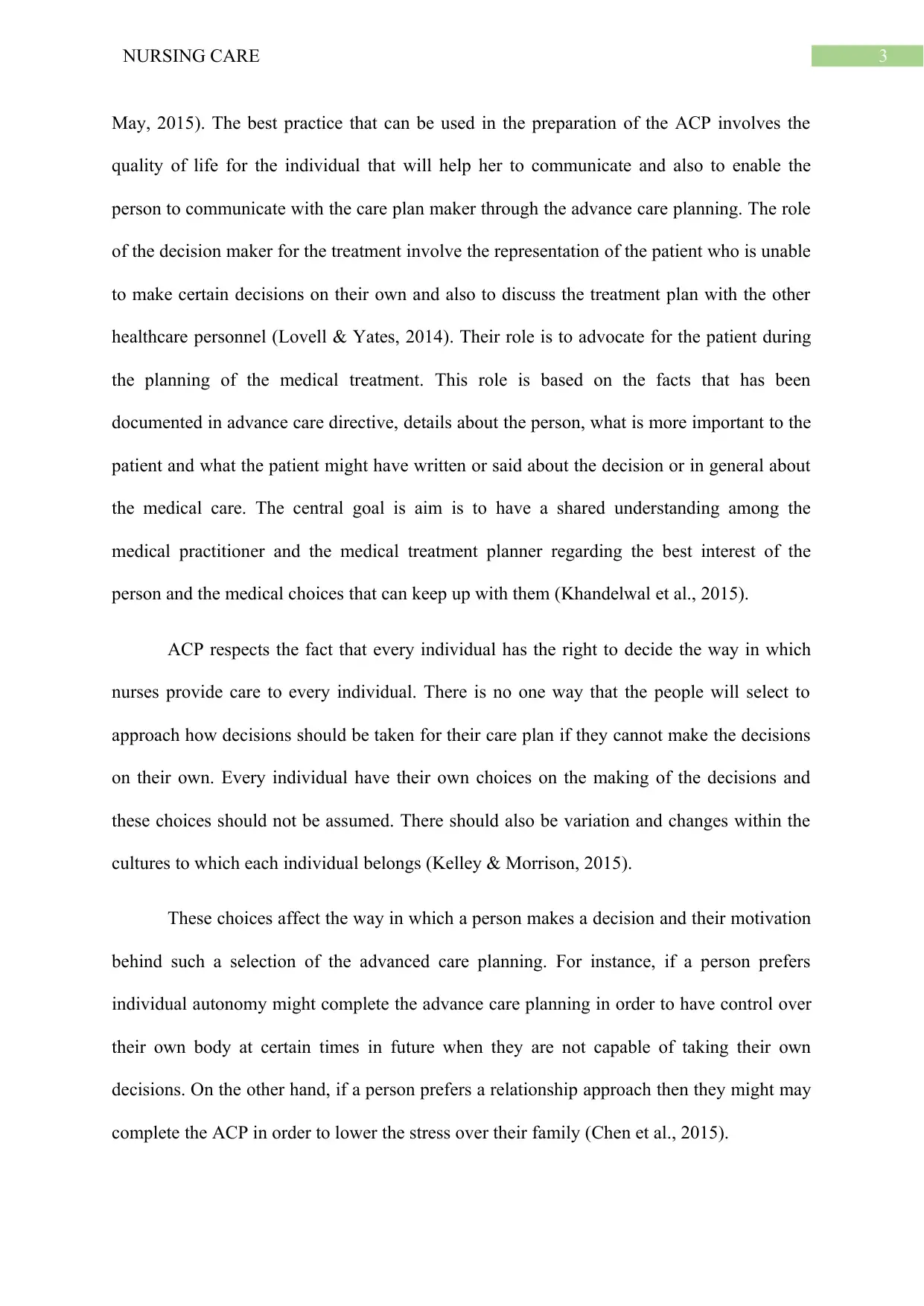
3NURSING CARE
May, 2015). The best practice that can be used in the preparation of the ACP involves the
quality of life for the individual that will help her to communicate and also to enable the
person to communicate with the care plan maker through the advance care planning. The role
of the decision maker for the treatment involve the representation of the patient who is unable
to make certain decisions on their own and also to discuss the treatment plan with the other
healthcare personnel (Lovell & Yates, 2014). Their role is to advocate for the patient during
the planning of the medical treatment. This role is based on the facts that has been
documented in advance care directive, details about the person, what is more important to the
patient and what the patient might have written or said about the decision or in general about
the medical care. The central goal is aim is to have a shared understanding among the
medical practitioner and the medical treatment planner regarding the best interest of the
person and the medical choices that can keep up with them (Khandelwal et al., 2015).
ACP respects the fact that every individual has the right to decide the way in which
nurses provide care to every individual. There is no one way that the people will select to
approach how decisions should be taken for their care plan if they cannot make the decisions
on their own. Every individual have their own choices on the making of the decisions and
these choices should not be assumed. There should also be variation and changes within the
cultures to which each individual belongs (Kelley & Morrison, 2015).
These choices affect the way in which a person makes a decision and their motivation
behind such a selection of the advanced care planning. For instance, if a person prefers
individual autonomy might complete the advance care planning in order to have control over
their own body at certain times in future when they are not capable of taking their own
decisions. On the other hand, if a person prefers a relationship approach then they might may
complete the ACP in order to lower the stress over their family (Chen et al., 2015).
May, 2015). The best practice that can be used in the preparation of the ACP involves the
quality of life for the individual that will help her to communicate and also to enable the
person to communicate with the care plan maker through the advance care planning. The role
of the decision maker for the treatment involve the representation of the patient who is unable
to make certain decisions on their own and also to discuss the treatment plan with the other
healthcare personnel (Lovell & Yates, 2014). Their role is to advocate for the patient during
the planning of the medical treatment. This role is based on the facts that has been
documented in advance care directive, details about the person, what is more important to the
patient and what the patient might have written or said about the decision or in general about
the medical care. The central goal is aim is to have a shared understanding among the
medical practitioner and the medical treatment planner regarding the best interest of the
person and the medical choices that can keep up with them (Khandelwal et al., 2015).
ACP respects the fact that every individual has the right to decide the way in which
nurses provide care to every individual. There is no one way that the people will select to
approach how decisions should be taken for their care plan if they cannot make the decisions
on their own. Every individual have their own choices on the making of the decisions and
these choices should not be assumed. There should also be variation and changes within the
cultures to which each individual belongs (Kelley & Morrison, 2015).
These choices affect the way in which a person makes a decision and their motivation
behind such a selection of the advanced care planning. For instance, if a person prefers
individual autonomy might complete the advance care planning in order to have control over
their own body at certain times in future when they are not capable of taking their own
decisions. On the other hand, if a person prefers a relationship approach then they might may
complete the ACP in order to lower the stress over their family (Chen et al., 2015).
Paraphrase This Document
Need a fresh take? Get an instant paraphrase of this document with our AI Paraphraser
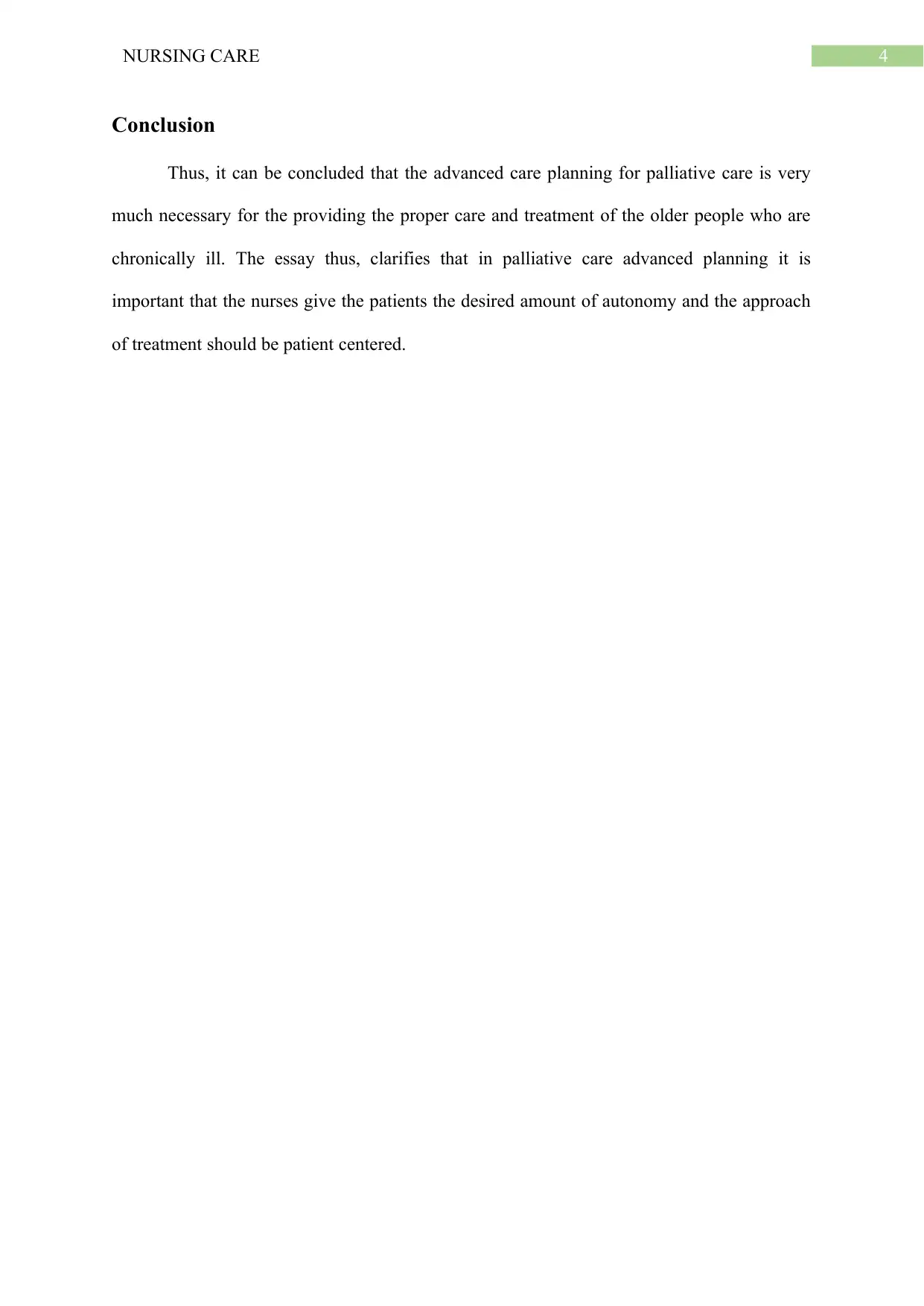
4NURSING CARE
Conclusion
Thus, it can be concluded that the advanced care planning for palliative care is very
much necessary for the providing the proper care and treatment of the older people who are
chronically ill. The essay thus, clarifies that in palliative care advanced planning it is
important that the nurses give the patients the desired amount of autonomy and the approach
of treatment should be patient centered.
Conclusion
Thus, it can be concluded that the advanced care planning for palliative care is very
much necessary for the providing the proper care and treatment of the older people who are
chronically ill. The essay thus, clarifies that in palliative care advanced planning it is
important that the nurses give the patients the desired amount of autonomy and the approach
of treatment should be patient centered.
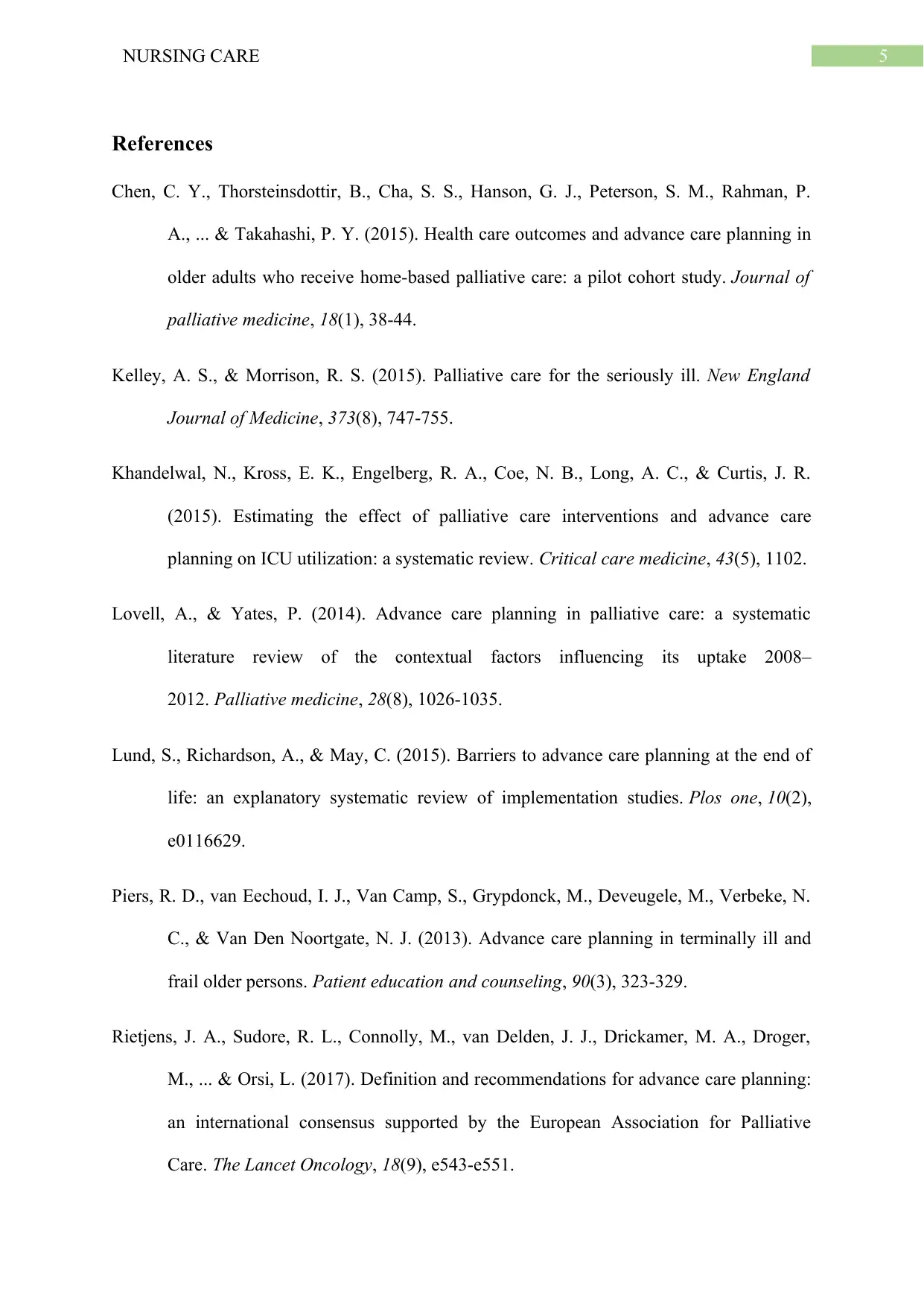
5NURSING CARE
References
Chen, C. Y., Thorsteinsdottir, B., Cha, S. S., Hanson, G. J., Peterson, S. M., Rahman, P.
A., ... & Takahashi, P. Y. (2015). Health care outcomes and advance care planning in
older adults who receive home-based palliative care: a pilot cohort study. Journal of
palliative medicine, 18(1), 38-44.
Kelley, A. S., & Morrison, R. S. (2015). Palliative care for the seriously ill. New England
Journal of Medicine, 373(8), 747-755.
Khandelwal, N., Kross, E. K., Engelberg, R. A., Coe, N. B., Long, A. C., & Curtis, J. R.
(2015). Estimating the effect of palliative care interventions and advance care
planning on ICU utilization: a systematic review. Critical care medicine, 43(5), 1102.
Lovell, A., & Yates, P. (2014). Advance care planning in palliative care: a systematic
literature review of the contextual factors influencing its uptake 2008–
2012. Palliative medicine, 28(8), 1026-1035.
Lund, S., Richardson, A., & May, C. (2015). Barriers to advance care planning at the end of
life: an explanatory systematic review of implementation studies. Plos one, 10(2),
e0116629.
Piers, R. D., van Eechoud, I. J., Van Camp, S., Grypdonck, M., Deveugele, M., Verbeke, N.
C., & Van Den Noortgate, N. J. (2013). Advance care planning in terminally ill and
frail older persons. Patient education and counseling, 90(3), 323-329.
Rietjens, J. A., Sudore, R. L., Connolly, M., van Delden, J. J., Drickamer, M. A., Droger,
M., ... & Orsi, L. (2017). Definition and recommendations for advance care planning:
an international consensus supported by the European Association for Palliative
Care. The Lancet Oncology, 18(9), e543-e551.
References
Chen, C. Y., Thorsteinsdottir, B., Cha, S. S., Hanson, G. J., Peterson, S. M., Rahman, P.
A., ... & Takahashi, P. Y. (2015). Health care outcomes and advance care planning in
older adults who receive home-based palliative care: a pilot cohort study. Journal of
palliative medicine, 18(1), 38-44.
Kelley, A. S., & Morrison, R. S. (2015). Palliative care for the seriously ill. New England
Journal of Medicine, 373(8), 747-755.
Khandelwal, N., Kross, E. K., Engelberg, R. A., Coe, N. B., Long, A. C., & Curtis, J. R.
(2015). Estimating the effect of palliative care interventions and advance care
planning on ICU utilization: a systematic review. Critical care medicine, 43(5), 1102.
Lovell, A., & Yates, P. (2014). Advance care planning in palliative care: a systematic
literature review of the contextual factors influencing its uptake 2008–
2012. Palliative medicine, 28(8), 1026-1035.
Lund, S., Richardson, A., & May, C. (2015). Barriers to advance care planning at the end of
life: an explanatory systematic review of implementation studies. Plos one, 10(2),
e0116629.
Piers, R. D., van Eechoud, I. J., Van Camp, S., Grypdonck, M., Deveugele, M., Verbeke, N.
C., & Van Den Noortgate, N. J. (2013). Advance care planning in terminally ill and
frail older persons. Patient education and counseling, 90(3), 323-329.
Rietjens, J. A., Sudore, R. L., Connolly, M., van Delden, J. J., Drickamer, M. A., Droger,
M., ... & Orsi, L. (2017). Definition and recommendations for advance care planning:
an international consensus supported by the European Association for Palliative
Care. The Lancet Oncology, 18(9), e543-e551.
⊘ This is a preview!⊘
Do you want full access?
Subscribe today to unlock all pages.

Trusted by 1+ million students worldwide

6NURSING CARE
Robinson, L., Dickinson, C., Bamford, C., Clark, A., Hughes, J., & Exley, C. (2013). A
qualitative study: professionals’ experiences of advance care planning in dementia
and palliative care,‘a good idea in theory but…’. Palliative medicine, 27(5), 401-408.
Robinson, L., Dickinson, C., Bamford, C., Clark, A., Hughes, J., & Exley, C. (2013). A
qualitative study: professionals’ experiences of advance care planning in dementia
and palliative care,‘a good idea in theory but…’. Palliative medicine, 27(5), 401-408.
1 out of 7
Related Documents
Your All-in-One AI-Powered Toolkit for Academic Success.
+13062052269
info@desklib.com
Available 24*7 on WhatsApp / Email
![[object Object]](/_next/static/media/star-bottom.7253800d.svg)
Unlock your academic potential
Copyright © 2020–2026 A2Z Services. All Rights Reserved. Developed and managed by ZUCOL.





